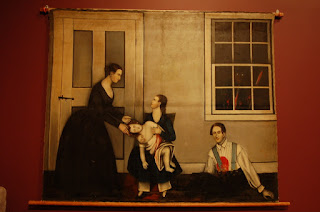LIFE IN THE ANDES
“I have a loathing towards that same Goshen, a disgust which is too violent to be suppressed; a low and mean groveling race are most of its inhabitants, and it is questionable which is most desired, their love or hate”- William H. Seward Lincoln’s Indispensable Man, Walter Stahr
I feel the same way as Henry Seward does about my New York neighbors. Leaving home at eighteen to attend college in the south (near Cherokee, North Carolina), married at twenty-two, and finally escaping to California in 1975, I still don’t know which I prefer the love or hate of the local hillbillies. Unlike Henry, I came back home to stay. I realize that to have the complete approval of my upstate neighbors is a trap. Many (not all) are that same “low and mean groveling race,” that young Henry Seward fled from in Goshen. If they all liked me I would question what the hell I was doing wrong? Other branches of the family felt the same way. They couldn’t wait to get the fuck out of New York.
When the American Revolution was over, only one family of Osterhouts headed north. This is Rev. Dr. Smith Stanley Osterhout’s and his pacifist niece, Mildred Osterhout’s, alien tree branch. The little cabin Ranger William Osterhout built on that Scarborough Bluffs property outside Toronto, is still there. It’s one of the oldest, original log structures in all of Canada. In a document filed in British Niagara May 21, 1796, William Osterhout petitioned, and received from, King George III, a tract of land in Canada. The document states:
“Petition of William Osterhout- late of Butlers Rangers-(as p his Discharge) Respectfully shews-That your Petitioner is married to Elizabeth, Daughter of William Pickard & that neither he or his wife have ever received any Land- That your petitioner is desirous to settle on the lands of the Crown in this Province, being in the condition to cultivate and improve the same. That he has taken the usual oaths, and subscribed the declaration, that he professes the Christian Religion, and obedience to the laws, and has lived inofensively in the country. Prays your Excellency, would pleased to grant him as a discharge Ranger 300 acres of land & to his wife 200 as a Daughter of a Loyalist U. E. and is in duty bound will ever pray.”
Four months after the hanging of Dunning and Teed, Nathaniel Knapp wrote a letter to his wife’s siblings, tenant farmers John and Fanny Teed, scrapping out a dirt poor living, near Andes, New York.
Dear Brother and Sister,
I once more set down to write to you with pleasure….. I received your letter that requests me to send one of them little books to you. But I have not seen one, nor do I care to see any. For I think that so unfair a thing should happen it grieves me some and all of his agents to think that after the trial was over judgments against four of them condemned to die, that they should then release the principle in the murder and principle in the accessory and have hung the two least guilty, in my opinion, that I don’t care see or have such a trial in my life again. I had done all I could do to get a reprieve, but all in vane. Hang James they would and after I found that there was no pardon for him I went to the Sheriff and requested his body……I laid him out on my own table and buried him with his children. He has gone and left us to mourn his hard fight. But not without having a hope that he has gone happy and now visits with his savior who was hanged on a tree.
We are well at present,
Nate and Deb Knapp
The “little book” the Knapps were referring to was The Report of the Trials of the Murderers of Richard Jennings. It had been quickly published and released in the summer of 1819. Thick grass was already growing over the grave of James Teed as his stone marker was knocked over by a loose horse, never to be put back in place. I’m sure it’s still laying there in Knapp’s field.
Dunning’s corpse, abandoned by the medical students, was returned to his cracked open casket; soon after the students realized he was way too ripe to provide any useful scientific information. The hastily patched coffin was re-interred in the same unmarked, and soon to be forgotten grave, down by the dump. By fall the apples hung heavy on the tree branches, dropping to the ground, obliterating any evidence of the crowd that had gathered the previous April.
Upon returning to New York from Putnam County in June, much to his parents’ delight, Henry Seward decided to stay in his detested Goshen; interning at Orange County prosecutors’ office of John Duer and Ogden Hoffman. His uncle’s murder had taken place less than six months prior to his return. Hannah Teed had moved to Newburgh and Jack and Conklin were in prison. His cousin had been hung in April, and the Seward family never mentioned it again. Instead, welcoming back their prodigal son, thanking the Lord for his safe return, everyone moved on. Whatever Henry’s involvement could possibly have been in the conspiracy to murder Richard Jennings, like the hanging in the orchard, it was all soon forgotten.

Comments
Post a Comment